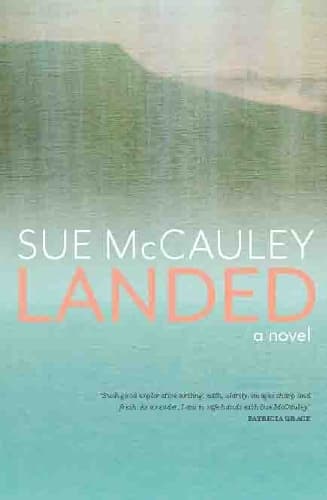Review: Landed
Reviewed by Jenny Purchase
Landed, Sue McCauley’s latest novel — and according to McCauley, her last — is a sweeping social history of 20th century New Zealand which traces sixty-something Briar Howland’s journey from her semi-idyllic childhood and youth in pre-World War II rural Canterbury through two marriages, motherhood and into her retirement, while also following the life trajectories of her extended family. As such, its scope is large, traversing the fate of a varied cast of characters and incorporating many twists and turns, showcasing as it does so McCauley’s considerable abilities.
The novel opens when Briar’s comfortable, ordinary life is turned upside down by the unexpected death of her husband: ‘… nothing about everyday life is any longer straightforward or certain. Stuff was happening behind her back while she vacuumed her polished rimu floors and pruned the roses… Now she’s out of date and out of step and it’s almost impossible… not to be dismayed…’
When it becomes clear that Brewer Howland has grossly mismanaged the couple’s finances, Briar is forced to make some difficult decisions about her future. The first half of the novel deals with how Briar copes with these huge changes. Her relationships with her now adult children, living in other parts of New Zealand, are foregrounded in this section, as they each, in their own way, support their mother through these adjustments, while navigating their own life challenges.
The second half of the novel sees Briar exploring her identity, travelling, forming unusual friendships, enrolling in a writing course, gradually becoming less idealistic and more assertive. As her new experiences lead her into strange and unknown territory, ‘Briar feels herself expand: her chest, her forearms, her eyes… It’s as if she has suddenly burst from a party cake as a sexy size-eight extrovert.’
The themes explored in Landed reflect the concerns of a mature woman who has become, to a large extent, superfluous in her children’s lives and invisible as a member of society. To make matters worse, Briar is confronted with loss compounded by loss, as many older people are, while simultaneously trying to understand changing social mores and keep abreast of technological advancements, all without much help, or sometimes, the wrong kind of help.
McCauley dedicates much page room to wider issues that concern us all: breakdown of the nuclear family, systematic failure of the neo-liberal economic model and it’s devastating effect on communities, race relations and the continued tension between coloniser and tangata whenua, the uncertainties of living in a world facing increasing geopolitical tension, devastating climate change and the threat of deadly pandemics; yet McCauley is an expert enough writer to treat these concerns in an intelligent way, always leavening the seriousness of her subject matter with wry humour and positivity.
McCauley’s masterly command of voice permeates the reading experience of this novel. From page one, the reader is expertly transported into Briar’s consciousness through a narrative style that preferences recount, reminiscence and reflection over action and dialogue. This approach is well suited to the novel’s subject matter because it represents the way in which our minds ‘free range’ over our personal histories and experiences, reflecting on the past, reacting to the present and pondering the future, often almost simultaneously. Yet, despite being written in the third person, the narrative voice is intimate — almost confessional — and has the effect of drawing the reader in close and allowing them to intimately experience Briar’s journey of discovery alongside her, as she navigates new territory and eventually finds her way.
This reflective narrative voice is expertly countered by the insertion of regular dialogue-dense scenes where characters talk past each other and miscommunication becomes a literary trope, representative of just how much change people are subjected to during a lifetime. These sections become a running commentary on whether change is always for the best or whether it replaces the status quo with more vacuous and ephemeral values.
Landed is a worthy addition to McCauley’s body of work which includes script writing, short and long-form fiction, theatre and film. She is perhaps best known for her first novel, Other Halves, which dealt with ethnic, gender, age and class differences in 1980s’ New Zealand, winning both the Goodman Fielder Wattie Book of the Year Award and the NZ Book Award for Fiction. Other Halves was subsequently made into a feature film and the book has been frequently reprinted, selling more than 20,000 copies: a remarkable achievement for a Kiwi writer. Long-standing admirers of McCauley’s accomplished writing and gritty subject matter will welcome the addition of Landed to her oeuvre.
Reviewed by Jenny Purchase
